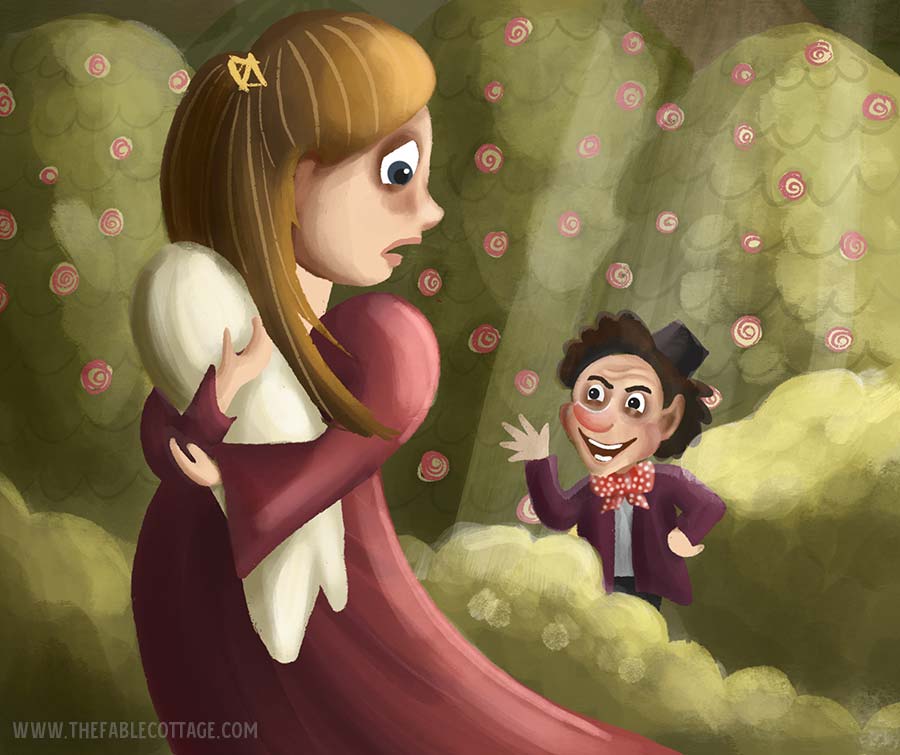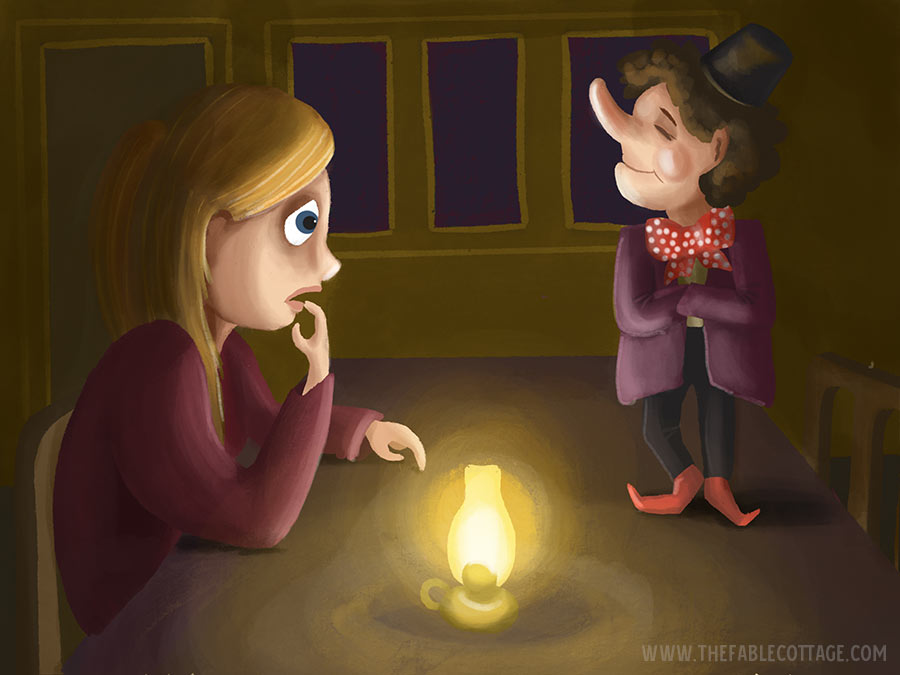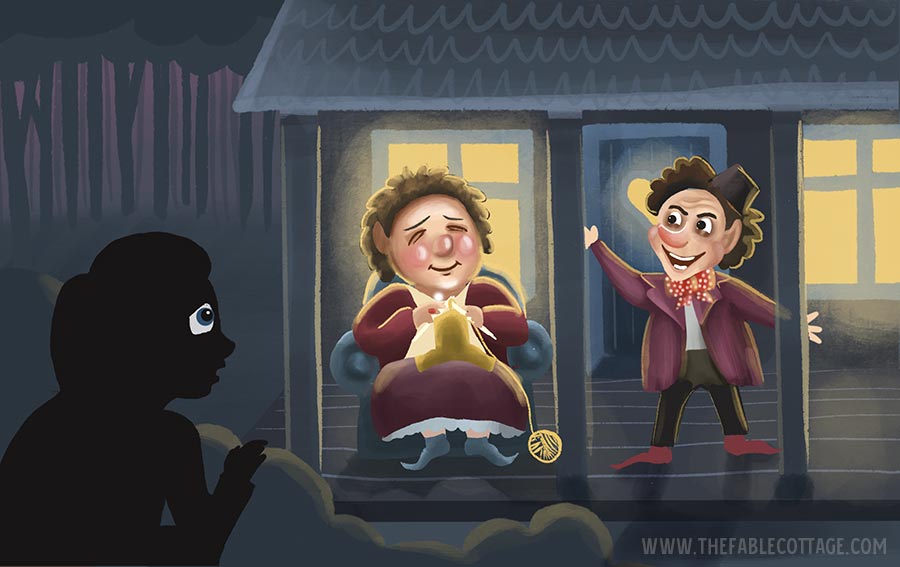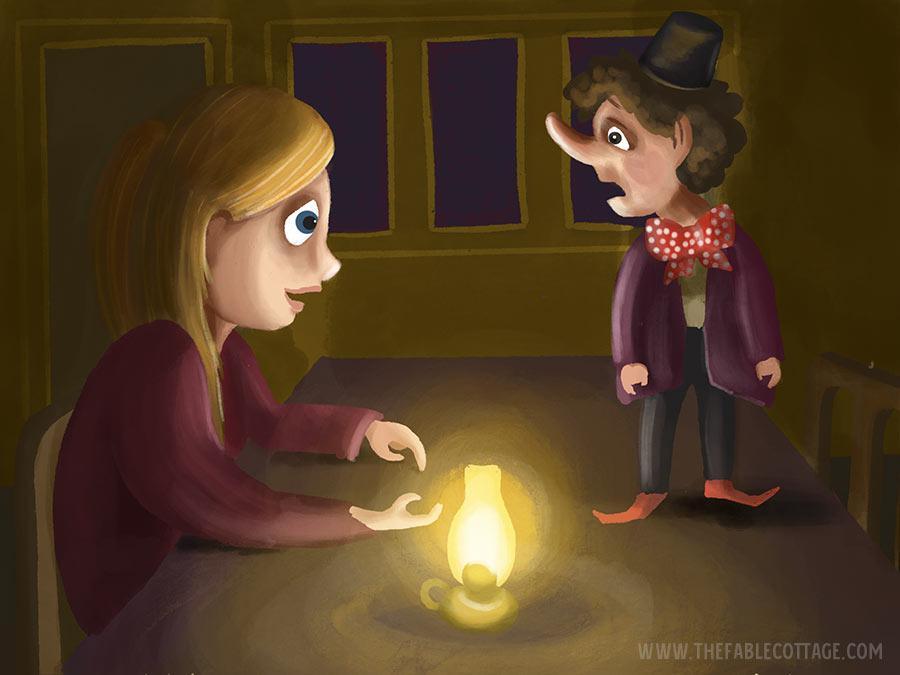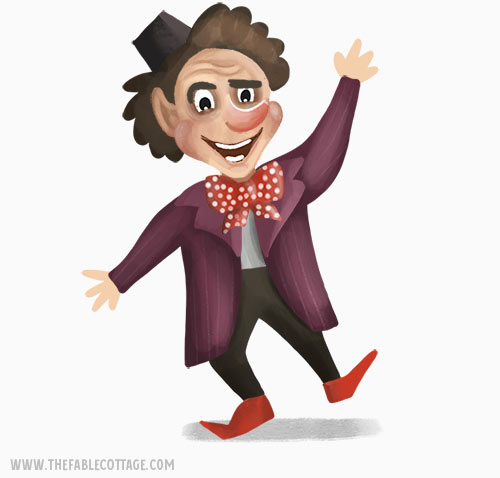Dix années passèrent. Sophie devint une femme intelligente et accomplie. Elle épousa un homme bon. Ils eurent un petit garçon.
Ten years passed. Sophie grew into (became) an intelligent and accomplished woman. She married a good man. They had a little boy.
Un matin, Sophie jouait avec son fils dans le jardin lorsqu’elle entendit cet étrange petit rire.
« Maa haa haa . Qu'est-ce que tu as pour moi? »
Le petit homme sortit de derrière un buisson.
One morning, Sophie was playing with her son in the garden when she heard that strange little laugh.
"Maa haa haa... What do you have for me?"
The little man came out from behind a bush.
« NON ! TU NE PEUX PAS LE PRENDRE ! » hurla Sophie. Elle serra le bébé contre sa poitrine. Elle pleura encore et encore.
"NO! YOU CAN'T HAVE HIM!" screamed Sophie. She hugged the baby against her chest. She cried and cried (again and again).
« Nous avions un accord, ma chère », dit le petit homme. « Mais je vais te faire une autre offre : Devine mon nom. Si tu dis mon nom, tu peux garder ton fils. Tu as trois jours. C’est d’accord ? »
Sophie pleura. « C’est d’accord. »
"We had an agreement, my dear," said the little man. "But I'll make you another deal: Guess my name. If you say my name, you can keep your son. You have three days. Is it a deal?"
Sophie cried. "It's a deal."
La nuit suivante le petit homme revint et Sophie essaya tous les noms courants :
« Est-ce Stéphane ? »
« ...Non »
« Est-ce Bertrand ? »
« ...Non »
« Est-ce José? »
« ...Non »
The next night the little man returned, and Sophie tried all the common names:
"Is it Stéphane?"
"...No."
"Is it Bertrand?"
"...No."
" Is it José?"
"...No."
La deuxième nuit, elle essaya quelques noms moins courants :
« Est-ce Barthélémy ? »
« ...Non »
« Est-ce Filibert ? »
« ...Non »
« Est-ce Ambroise ? »
« ...Non »
The second night she tried a few less common names:
"Is it Barthélémy?"
"...No"
"Is it Filibert?"
"...No"
" Is it Ambroise?"
"...No"
Le troisième jour, Sophie était en panique. Elle alla se promener dans la forêt. Il se faisait déjà tard.
The third day, Sophie was panicking (in panic). She went for a walk in the forest. It was already (getting) late.
« Ses pieds sont pointus, comme les Norvégiens », pensa-t-elle. « Alors son nom est peut-être ... Bjørn ? Mais son nez est rouge, comme les Australiens. Alors peut-être que son nom est ... Keith ? Mais son chapeau a l’air Turc ! Alors peut-être que son nom est ... Moustapha ?... »
"His feet are pointed, like a Norwegian," she thought. "So maybe his name is ... Bjørn? But his nose is red, like an Australian. So maybe his name is ... Keith? But his hat looks Turkish! So maybe his name is ... Moustapha? ... "
Sophie alla de plus en plus loin dans la forêt. Elle enjamba des bûches et grimpa sur des rochers, puis tourna un coin. Elle fut très surprise de voir une petite maison.
Sophie went further and further into the forest. She stepped over logs and climbed over rocks, then turned a corner. She was very surprised to see a small house.
Une femme était assise sur le porche. Elle tricotait des vêtements de bébé et chantait doucement. Elle avait le collier de Sophie au cou. Elle avait la bague de Sophie au doigt.
A woman was sitting on the porch. She was knitting baby clothes and singing softly. She had Sophie's necklace around her neck. She had Sophie's ring on her finger.
« Tracassin ! Tracassin, mon amour ! Peux-tu venir ici ? » appela la femme. « J’ai besoin de ton aide pour tricoter ! »
Et devinez qui apparut à la porte ? C’était le petit homme !
"Tracassin! Tracassin, my love! Can you come here?" shouted the woman. "I need your help to knit!"
And guess who appeared at the door? It was the little man!
Sophie se cacha derrière un buisson. Quelle chance ! Elle courut chez elle aussi vite qu’elle le put.
Sophie hid behind a bush. What luck! She ran home as fast as she could.
Cette nuit, le petit homme vint voir Sophie. Le petit homme avait l’air très heureux.
« C’est l’heure ma chère », dit-il. « Alors, connais-tu mon nom ? »
That night, the little man came to see Sophie. The little man looked very happy.
"It's time, my dear," he said. "So, do you know my name?"
« Est-ce Trismégiste ? »
« ...Non »
« Est-ce Tractopelle ? »
« ...Non »
« Est-ce... Tracassin ? »
"Is it Trismégiste?"
"...No"
"Is it Tractopelle? (backhoe loader / digger)"
"...No"
" Is it ... Tracassin?"
"..."
Le visage du petit homme devint rouge de colère.
« AAAAAAHHHHHHHH ! »
Il hurla et cria et tapa des pieds. « Comment as-tu su mon nom ? COMMENT AS-TU SU MON NOM ? »
The little man's face turned red with anger.
"ARRRRRRRRRRGH!"
He screamed and shouted and stomped his feet. "How did you know my name? HOW DID YOU KNOW MY NAME?!"
Puis il s’arrêta et pleura. Il leva les yeux vers Sophie.
« Nous aurions beaucoup aimé ton fils », chuchota-t-il.
Le petit homme essuya ses larmes avec un mouchoir jaune et disparut.
Then he stopped and cried. He looked up at Sophie.
"We would have loved your son very much," he whispered.
The little man wiped his tears with a yellow handkerchief and disappeared.
Après ça, Sophie et sa famille vécurent heureux jusqu’à la fin des temps, comme dans les contes. Mais qu’arriva-t-il au petit homme ?
After that, Sophie and her family lived happily ever after (happily until the end of time), like in the stories. But what happened to the little man?
Eh bien, regardez attentivement lorsque vous entendez des gens raconter de gros mensonges. Parce que les gros mensonges demandent toujours de gros paiements...
Well, look closely when you hear people telling big lies. Because big lies always demand big payments...
...Tracassin sera généralement là. Sous la table ou perché sur l’armoire. Il attend toujours de conclure un bon marché.
... Tracassin will usually be there. Under the table, or perched on top of the cupboard. He is always waiting to make a good deal.

Download this audio
Need help? How to download audio to your device


